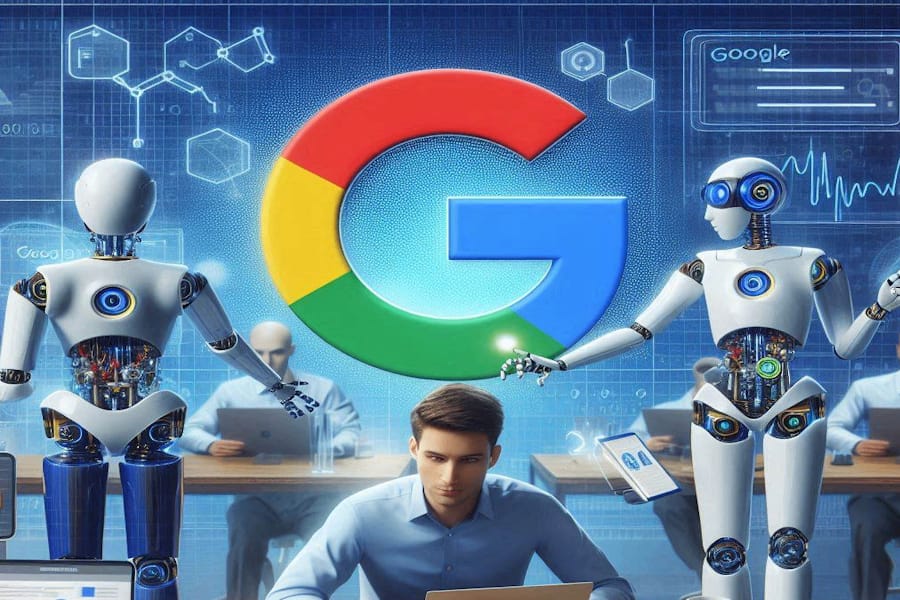Google’s AI Agents
A Game-Changer for Businesses and Everyday Life

Publish Date: Last Updated: 21st June 2025
Author: nick smith- With the help of GROK3
In a groundbreaking white paper released in February 2025, Google’s team of AI experts unveils the future of artificial intelligence through “AI agents”—smart, autonomous systems that could transform how we work, drive, and solve problems. Titled Agents Companion, the paper introduces a new era of AI that goes beyond simple chatbots, offering practical tools for businesses and innovative solutions for daily life. Here’s what Google’s findings mean and how they’ll shape the world of AI.
What Are AI Agents?
Imagine having a team of virtual assistants, each an expert in a specific task, working together to make your life easier. That’s the essence of AI agents. Unlike traditional AI models that just answer questions, these agents can think, plan, and act on their own to achieve goals. For example, in a car, one agent might help you find a restaurant, another could play your favorite music, and a third could explain how to turn off a pesky dashboard alert—all while coordinating seamlessly.
Google’s paper explains that AI agents are built with three key parts: a brain (the language model that makes decisions), tools (like apps or databases they use to get information), and a coordinator (a system that helps them plan and act). This setup allows agents to tackle complex tasks, from helping doctors research medical treatments to automating office workflows.
Key Findings: Smarter, Collaborative AI
Google’s research highlights several exciting advancements:
-
Teamwork Makes the Dream Work: The paper introduces “multi-agent systems,” where multiple AI agents collaborate like a team of specialists. For instance, in a car, one agent might handle navigation, while another drafts a text message, and a third answers trivia questions. This teamwork makes AI more accurate, efficient, and capable of handling tricky tasks.
-
Learning from Humans: Google emphasizes the importance of human feedback to make AI agents better. By combining automated tests with real people’s opinions, developers can ensure agents are not only smart but also practical and user-friendly.
-
Supercharged Search: The paper introduces “Agentic RAG” (Retrieval-Augmented Generation), a fancy term for AI that searches smarter. Instead of pulling random facts, these agents refine their searches, check for errors, and deliver precise answers. This is a big deal for fields like healthcare or law, where accurate information is critical.
-
From Assistants to Contractors: Google proposes a new idea called “contractor agents.” These agents work like professionals you hire, with clear goals and the ability to negotiate tasks. This could make AI more reliable for serious jobs, like managing business projects or scientific research.
-
Real-World Impact: The paper showcases how AI agents are already making waves. In cars, they create seamless driving experiences by handling everything from music to navigation. In offices, they help workers analyze data, write reports, or automate repetitive tasks. Google’s tools, like Agentspace and NotebookLM Enterprise, are designed to bring these benefits to businesses of all sizes.
How This Impacts AI Development
Google’s findings are set to accelerate AI’s role in our lives, with big implications for developers and users alike:
-
Easier for Businesses to Use AI: Tools like Google Agentspace and Vertex AI Agent Builder make it simpler for companies to create custom AI agents. This means small businesses can use AI to streamline tasks like customer service or inventory management, leveling the playing field with bigger players.
-
More Reliable AI: By focusing on teamwork, human feedback, and clear task definitions (like contracts), Google is tackling AI’s biggest challenge: trustworthiness. This could lead to AI systems that businesses and people can depend on for critical tasks, from medical research to financial planning.
-
Smarter Cars and Devices: The automotive example shows how AI agents can make everyday tech—like cars or smart home devices—more intuitive. Expect future cars to feel like having a personal assistant on board, handling everything from traffic updates to entertainment with ease.
-
A Boost for Innovation: Google’s open call to developers to experiment with these tools will spark new ideas. From apps that help students study to systems that speed up scientific discoveries, the possibilities are endless.
What’s Next?
Google’s vision is clear: AI agents are the future, and they’re here to make life easier, work smarter, and problems simpler to solve. The paper encourages developers to dive in, using tools like Google’s Agentspace and Vertex AI to build the next big thing. For the rest of us, it’s a glimpse into a world where AI doesn’t just answer questions—it takes action, collaborates, and adapts to our needs.
As Google puts it, “The future of AI is agentic.” Whether you’re a business owner, a driver, or just curious about tech, that future is looking brighter—and a lot smarter—thanks to AI agents. Read the full paper.
AI News Articles
AI Questions and Answers section for Google AI Agents Future Business Technology
Welcome to a new feature where you can interact with our AI called Jeannie. You can ask her anything relating to this article. If this feature is available, you should see a small genie lamp above this text. Click on the lamp to start a chat or view the following questions that Jeannie has answered relating to Google AI Agents Future Business Technology.
Be the first to ask our Jeannie AI a question about this article
Look for the gold latern at the bottom right of your screen and click on it to enable Jeannie AI Chat.





